
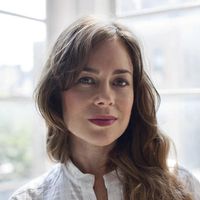
In 2005, right before leaving for an artist's colony, I met a man at a holiday party. D is extremely tall, with uncommonly large, navy-blue eyes, and the most disarming sincerity I've ever encountered. We chatted briefly in the kitchen, and later, before he left, he found me and said, "I would like to take you to dinner. May I have your contact information?"
Accustomed as I was to the standard vague e-mail—"Hey, we should hang out sometime"—I was charmed by this direct approach. On our second date, at a French bistro in Tribeca, we couldn't stop laughing, over what I have no idea. He is very funny, and eccentric, a visual person and also an actual visionary (he invents new ways to use preexisting technologies). Talking with him was a cross-cultural exchange. I couldn't get enough of how he said things I couldn't comprehend.
At one point, he announced, "I'm a provider. All I do is work—I want to work so the woman I marry can do whatever she wants." I laughed. "Really? Why do men continue to think they have to be the breadwinner?"
"I don't know," he said. "It's just how I am." His candor made what might have felt annoyingly chauvinist feel OK.
Not for years had I been so at ease with another person. Our separate fascinations dovetailed into a curiosity cabinet that we filled on epic walks through the city, poking through Japanese toy stores and the last remaining flea markets. Like me, he has an archivist's soul. I also liked that he's ambitious and scrappy (he was launching a technology startup from his living room). At this point, I was working full-time at an interior design magazine, writing a column for The Boston Globe, and teaching a writing class at New York University—a genuinely workaholic schedule—but he didn't mind. When I was so exhausted I couldn't decide what to eat for dinner, he'd suggest breakfast instead, and we'd go to a diner for pancakes.
My friends liked him. My family did, too. It felt nice to be taken care of. And he was so good at it, a born caretaker. One afternoon, as I cried over my endless deadlines, he actually scooped me up like a child and walked in circles around his living room, saying, "One day you were little Kate Bolick in a little town, and then you came to the biggest city in America and now look at yourself! It's all worked out!" It was so ridiculous and sweet that I couldn't help laughing through my tears.
A few months later, I went to Paris for the first time, with D and his parents and two brothers, all of whom I adored, and traipsed happily behind them from one place to the next. What wonderful in-laws they'd be, I thought.
Stay In The Know
Marie Claire email subscribers get intel on fashion and beauty trends, hot-off-the-press celebrity news, and more. Sign up here.
At one point, he announced, "I want to work so the woman I marry can do whatever she wants.
And yet, something was off. I'd been working so much I hadn't even thought about this trip; I just showed up. At 34 years old, I still wasn't living my own life. All I did was work late, have dinner with D or a friend, drink one glass of wine too many, and afterward lie on the sofa, an empty husk.
Not long after D and I returned to New York, I met up with new friends for drinks, writers all, without him. As our conversation gained momentum, I felt a forgotten energy fizz up and down my arms and legs. I hardly knew these people, and yet the immediacy with which we shared references and ideas made me feel at home in a way that being with D never had.
That Christmas, D's parents brought us to a luxurious eco-resort in Mexico. D and I had our own hacienda with a massive bed draped in white mosquito netting, romantic as a honeymoon.
I was sick with a sense of duplicity. I didn't know why, but I just didn't want this—this being part of a family. It didn't make sense. I love my family. I loved D's. I suspected (and still do) that I would love being a mother—which, I realized as we trooped en famille down to the beach each afternoon, was part of the problem.
Shielded by an umbrella, I peered over the rim of Middlemarch and watched a woman my age hoist her toddler onto her hip. My arms ached to hold the girl, feel that plump cheek rest against my shoulder, let my nose graze the top of her head.
The knowing was visceral: If I became a mother, I'd lose myself. I wouldn't become a "real" writer. This was irrational—plenty of women write and also have children, and yet for me, it seemed improbable. I'd be erased by pregnancy, sleep deprivation, sippy cups, bouncy houses; all-consuming love and eternal worry ("Now my heart lives outside of me," a friend said about her small twins).
I wanted to want a man who wanted to support me, along with all the possibilities such an arrangement suggests—being able to afford a nanny so I could write full-time and also raise children, maybe even fulfill my adolescent dream of designing and building my own house. But I kept tripping up over that tiny construction, "my own."
That afternoon, D and his brothers and I played in the pool like a pack of unhinged otters. The sky was clear, the sea spangled. So much beauty handed to me, a gift on a platter. Later, I told D I didn't want to shower together and spent a long time in the bathroom washing my hair and combing through the conditioner. Was it possible that being self-supporting wasn't just a "goal," but a state of being that was integral to my motivation and sense of self? Maybe it wasn't a coincidence that before D I'd dated only fellow writers, who hustled paycheck to paycheck like I did. Slipping into an easier life was akin to abandoning myself. I needed to create my own security.
On the last day of the Mexico trip, D's mother and I took a walk on the beach. "My husband is the most important thing in the world to me," she said. We'd never spoken intimately; I liked that the walk was bringing this out of her. But I wasn't sure where she was headed. "Kate, I would love to have you as my daughter-in-law. But you should only marry someone if he is more important than anyone or anything else." It was the kindest thing she could have done for any of us. Back in New York, D and I broke up. I was very, very sad. But not frightened.
This article appears in the April 2015 issue of Marie Claire, on newsstands now, and was adapted from Spinster: Making A Life of One's Own, copyright © 2015 by Kate Bolick, to be published by Crown Publishers, an imprint of Penguin Random House LLC, on April 21.
You should also check out:
7 Ways to Be Independent in Your Relationship
-
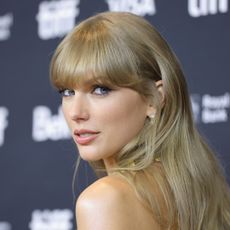 All the Easter Eggs and Name Drops on Taylor Swift's 'The Tortured Poets Department,' Explained
All the Easter Eggs and Name Drops on Taylor Swift's 'The Tortured Poets Department,' ExplainedDigging through the fan theories so you don't have to.
By Quinci LeGardye Published
-
 This Week's Best On-Sale Picks Include a Tory Burch Bag and Pretty Silver Ballet Flats
This Week's Best On-Sale Picks Include a Tory Burch Bag and Pretty Silver Ballet FlatsWarm weather is finally here—it's time to dress like it.
By Brooke Knappenberger Published
-
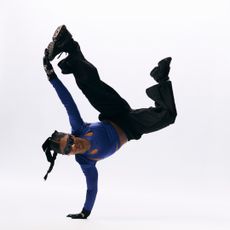 A Sporty It-Sneaker Era Is About to Begin
A Sporty It-Sneaker Era Is About to BeginNike's next Air models are designed for Olympic athletes, but they'll soon be all over street style.
By Halie LeSavage Published
-
 30 Female-Friendly Porn Websites for Any Mood
30 Female-Friendly Porn Websites for Any MoodAll the best websites, right this way.
By Kayleigh Roberts Published
-
 The 82 Best Cheap Date Ideas for Couples on a Budget
The 82 Best Cheap Date Ideas for Couples on a Budget"Love don't cost a thing." —J.Lo
By The Editors Last updated
-
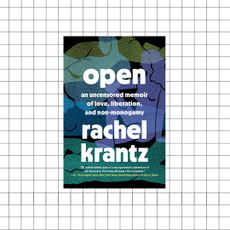 Diary of a Non-Monogamist
Diary of a Non-MonogamistRachel Krantz, author of the new book 'Open,' shares the ups and downs of her journey into the world of open relationships.
By Abigail Pesta Published
-
 COVID Forced My Polyamorous Marriage to Become Monogamous
COVID Forced My Polyamorous Marriage to Become MonogamousFor Melanie LaForce, pandemic-induced social distancing guidelines meant she could no longer see men outside of her marriage. But monogamy didn't just change her relationship with her husband—it changed her relationship with herself.
By Melanie LaForce Published
-
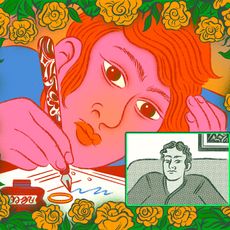 COVID Uncoupling
COVID UncouplingHow the pandemic has mutated our most personal disunions.
By Gretchen Voss Published
-
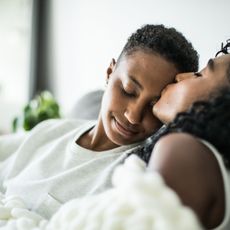 16 At-Home Date Ideas When You're Stuck Indoors
16 At-Home Date Ideas When You're Stuck IndoorsStaying in doesn't have to be boring.
By Katherine J. Igoe Published
-
 Long Distance Relationship Gift Ideas for Couples Who've Made It This Far
Long Distance Relationship Gift Ideas for Couples Who've Made It This FarAlexa, play "A Thousand Miles."
By Jaimie Potters Published
-
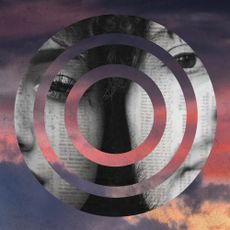 15 Couples on How 2020 Rocked Their Relationship
15 Couples on How 2020 Rocked Their RelationshipCouples confessed to Marie Claire how this year's many multi-stressors tested the limits of their love.
By Sherry Amatenstein, LCSW Published